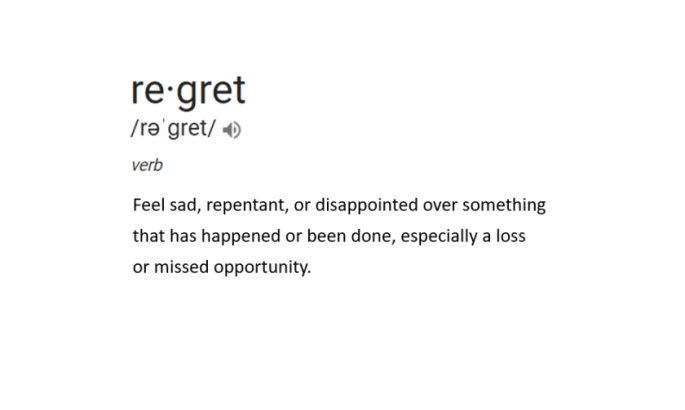Key Takeaways
- Regret can be a powerful motivator for personal growth and improved decision-making.
- Understanding the root causes of regret helps in addressing and transforming it into positive action.
- Common types of regret include missed educational opportunities, career decisions, and relationship choices.
- Practicing mindfulness and self-compassion can reduce the intensity of regret and its impact on well-being.
- Effective strategies for overcoming regret involve acknowledging emotions, learning from past mistakes, and setting future goals.
Understanding Regret: A Self-Improvement Tool
Regret is an emotion that every one of us has felt at some point in our lives. It’s that sinking feeling when we realize that a decision or action has led to an undesirable outcome. But here’s the silver lining: regret doesn’t have to be just a negative experience. In fact, it can be a powerful tool for self-improvement if we learn to harness it effectively.
Reasons Behind Regret
Why do we experience regret? At its core, regret arises from a mismatch between our expectations and reality. We often regret actions that don’t align with our values or when we miss opportunities that could have led to a better outcome. This feeling is a natural response that signals us to reassess our choices and consider alternative paths.
Most importantly, regret often stems from two main sources: actions we’ve taken and actions we’ve failed to take. The latter, known as “inaction regret,” can be more profound and long-lasting because of the lingering “what if” scenarios. For example, someone might regret not pursuing a passion or missing out on a significant life event.
Besides that, regret can also be fueled by social comparisons. When we see others achieving what we desire, it can amplify feelings of regret about our own choices. Understanding these underlying causes is crucial in transforming regret into a catalyst for growth.

“Erin Theodorou …” from theodoroutherapy.com and used with no modifications.
The Common Types of Regret
Regret manifests in various forms, often revolving around major life decisions. Let’s explore some common types:
- Educational Regrets: Many people look back and wish they had pursued a different field of study or taken their education more seriously.
- Career Regrets: This involves dissatisfaction with job choices, missed promotions, or not taking risks that could have advanced one’s career.
- Relationship Regrets: These regrets often stem from missed opportunities to connect with others or from actions that harmed relationships.
- Personal Development Regrets: This includes not following through on personal goals or failing to develop certain skills or habits.
The Impact on Emotional Well-being
Regret can have a significant impact on our emotional well-being. It can lead to feelings of sadness, frustration, and even anger. Over time, if not addressed, regret can contribute to stress and anxiety. However, understanding that regret is a natural part of the human experience can help us manage its effects more effectively.
Moreover, processing regret requires a delicate balance. It’s essential to allow yourself to feel the emotions associated with regret without becoming stuck in them. Practicing self-compassion is key. By acknowledging that everyone makes mistakes, we can begin to forgive ourselves and move forward.
In the next sections, we will delve into the scientific insights on regret and explore actionable strategies to transform it into a stepping stone for personal growth.
Scientific Insights on Regret
Regret is not just an emotional experience; it’s also a fascinating subject of scientific study. Researchers have delved into understanding how regret works in our minds and bodies. This research offers valuable insights into how we can use regret as a tool for personal development.
Research Findings by Thomas Gilovich
Thomas Gilovich, a prominent psychologist, has extensively studied regret and its implications. His research highlights that people tend to regret inactions more than actions. This means that we often lament the things we didn’t do more than the mistakes we made. For instance, someone might regret not traveling when they had the chance, more than they regret a trip that didn’t go as planned.
Gilovich’s findings suggest that taking proactive steps and embracing opportunities can reduce future regret. This doesn’t mean we should act recklessly, but rather, we should weigh our options and make informed decisions that align with our values.

“How to Avoid the Season of Regret | RAND” from www.rand.org and used with no modifications.
Brain and Body Reactions to Regret
When we experience regret, our brain reacts in specific ways. Studies using brain imaging have shown that regret activates areas associated with decision-making and emotional processing. This indicates that regret is deeply intertwined with how we evaluate our choices and learn from them.
Moreover, the physical sensations of regret—like a heavy heart or a pit in the stomach—are signals from our body urging us to pay attention and reflect. Understanding these reactions can help us better manage and respond to regret, turning it into a learning opportunity.
Why Regret Can Be Beneficial
While regret might feel uncomfortable, it serves an essential purpose. It acts as an internal feedback mechanism, guiding us toward better choices in the future. Regret can motivate us to change our behavior, avoid repeating mistakes, and strive for personal growth.
Additionally, regret can foster empathy and understanding. By reflecting on our past actions and their impact on others, we can develop a deeper sense of compassion and connection. This, in turn, enhances our relationships and overall well-being. If you are seeking ways to cope, consider exploring coping strategies for rejection to further enhance your emotional resilience.
Strategies to Transform Regret into Growth
Now that we understand the science behind regret, let’s explore practical strategies to transform it into a powerful tool for personal growth. By actively engaging with our regrets, we can learn valuable lessons and make positive changes in our lives.
Acknowledging and Accepting Emotions
The first step in dealing with regret is to acknowledge and accept your emotions. It’s normal to feel upset or disappointed about past decisions. Allow yourself to experience these feelings without judgment. This acceptance is crucial for moving forward, as explained in the science of overcoming regret.
Consider journaling your thoughts or talking to someone you trust. Expressing your emotions can provide clarity and help you process your feelings more effectively. Remember, it’s okay to feel regret—it’s what you do with it that matters.
Learning from Past Decisions
Regret offers an opportunity to learn from our past decisions. Reflect on what led to the regretful situation and identify any patterns or triggers. Ask yourself questions like: What could I have done differently? What have I learned from this experience? For further insights, explore what science tells us about overcoming regret.
By analyzing your past choices, you can gain valuable insights that inform your future decisions. This reflection helps you avoid similar mistakes and empowers you to make choices that align with your values and goals.
Setting Future Goals Based on Insights
Once you’ve learned from your past, it’s time to set future goals. Use the insights gained from reflecting on your regrets to create actionable and achievable objectives. These goals should be specific, measurable, and aligned with your values.
For example, if you regret not spending enough time with family, set a goal to have regular family dinners or plan a monthly outing. By taking proactive steps, you can prevent future regret and create a fulfilling life.
Practical Tips for Reducing Regrettable Actions
While it’s impossible to eliminate regret entirely, there are practical steps you can take to minimize it. By adopting specific strategies, such as learning intuition guidance tips, you can make more informed decisions and reduce the likelihood of future regrets.
The Role of Acceptance
Acceptance plays a significant role in reducing regret. Embrace the fact that you can’t change the past, but you can influence your future. This mindset shift allows you to focus on what you can control and make better choices moving forward. For more insights, explore these methods for wisdom development that can aid in making informed decisions.
Practice mindfulness techniques to stay present and avoid dwelling on past mistakes. By focusing on the here and now, you can make decisions that reflect your current values and priorities.
Mapping Regrets to Future Actions
Mapping your regrets to future actions involves creating a plan to address the areas where you feel regret. Identify specific steps you can take to rectify past mistakes or prevent similar situations from occurring. For more insights, explore what science tells us about overcoming regret.
For instance, if you regret not pursuing a hobby, make a commitment to start small and gradually build your skills. By taking action, you can transform regret into motivation and achieve personal growth.
Decision-making Techniques to Minimize Regret
Effective decision-making techniques can help minimize regret. Before making a choice, consider the potential outcomes and how they align with your values. Use tools like pros and cons lists or decision matrices to evaluate your options.
Additionally, practice self-reflection and seek feedback from trusted individuals. Their perspectives can provide valuable insights and help you make informed decisions. By taking a thoughtful approach, you can reduce the likelihood of future regrets.

Moving Forward with Purpose
As you work through your regrets, remember that personal growth is a continuous journey. By acknowledging your emotions, learning from your past, and setting future goals, you can transform regret into a powerful tool for self-improvement.
Develop new habits that align with your values and create a life filled with purpose and fulfillment. Use regret as a stepping stone for growth, and embrace the opportunities that come your way. With the right mindset and strategies, you can overcome regret and build a brighter future.
Developing New Habits Aligned with Values
Developing new habits that align with your values is essential for overcoming regret. Start by identifying your core values—what truly matters to you in life. Once you have a clear understanding of these values, you can begin to form habits that support them.
For example, if health is a core value, consider incorporating regular exercise into your routine. If family is important, make it a habit to spend quality time with loved ones each week. By aligning your habits with your values, you create a life that feels authentic and fulfilling, reducing the potential for future regret. Discover more about overcoming sadness and living a fulfilling life.
Creating Achievable Goals
Setting achievable goals is another powerful strategy for overcoming regret. Goals provide direction and purpose, helping you focus your efforts on what truly matters. When setting goals, ensure they are specific, measurable, attainable, relevant, and time-bound (SMART).
Start by breaking down larger goals into smaller, manageable steps. This approach makes the process less overwhelming and increases the likelihood of success. Celebrate small victories along the way to stay motivated and reinforce positive behavior. By setting and achieving goals, you move forward with intention, minimizing the chances of future regret.
Utilizing Regret as a Stepping Stone for Growth
Regret can be a valuable teacher if we allow it to be. Instead of dwelling on past mistakes, use regret as a stepping stone for growth. Reflect on what you’ve learned from your experiences and how you can apply these lessons moving forward.
Consider keeping a journal to document your reflections and insights. This practice helps solidify your learning and provides a reference point for future decisions. By viewing regret as an opportunity for growth, you empower yourself to make better choices and live a more fulfilling life. For more strategies, explore this science-based guide for restoring power.
Frequently Asked Questions (FAQs)
Regret is a complex emotion that can be challenging to navigate. Here are some frequently asked questions to help you better understand and manage regret:
“Regret can be a powerful motivator for personal growth and improved decision-making.” To explore this concept further, you can read about overcoming regret as discussed by neurobehavioral scientists.
Understanding and addressing regret is crucial for personal development. By exploring these questions, you can gain valuable insights into how to transform regret into a positive force in your life. If you’re looking for more ways to improve your personal development, consider these self-respect tips to enhance your journey.
How can mindfulness help with regret?
Mindfulness is a powerful tool for managing regret. By practicing mindfulness, you learn to stay present and observe your thoughts and emotions without judgment. This awareness allows you to acknowledge regret without becoming overwhelmed by it.
Mindfulness techniques, such as meditation and deep breathing, can help calm your mind and reduce the intensity of regret. By staying present, you can focus on making better decisions in the moment, rather than dwelling on past mistakes.
Can all regrets be resolved?
Not all regrets can be fully resolved, but they can be managed and transformed into learning experiences. Some regrets may involve situations beyond your control, while others may require time and effort to address.
Focus on what you can change and take proactive steps to address regrets within your control. By doing so, you can reduce the impact of regret and move forward with greater confidence and clarity.
Is it normal to feel regret for many years?
Yes, it’s normal to feel regret for an extended period, especially if the regret involves significant life events or decisions. However, it’s important to address these feelings to prevent them from negatively impacting your well-being. For some helpful advice, consider exploring techniques to overcome sadness that can aid in managing regret.
Consider seeking support from a therapist or counselor to work through long-standing regrets. Professional guidance can provide valuable insights and strategies for processing and overcoming these emotions.
What if my regrets involve others?
Regrets involving others can be particularly challenging, as they may involve hurt feelings or damaged relationships. In such cases, it’s important to approach the situation with empathy and understanding.
Consider reaching out to the individuals involved to express your feelings and offer an apology if necessary. Open communication can help mend relationships and reduce feelings of regret. Remember, it’s never too late to take responsibility and make amends.
How can I prevent regret in decision-making?
Preventing regret in decision-making involves thoughtful consideration and reflection. Before making a decision, consider the potential outcomes and how they align with your values and goals. For further insights, explore what science tells us about overcoming regret.
Use decision-making tools, such as pros and cons lists, to evaluate your options. Seek input from trusted friends or mentors to gain different perspectives. By taking a deliberate approach, you can make informed decisions that minimize the likelihood of future regret.
Regret is a complex emotion that can significantly impact our mental health and well-being. Understanding the underlying psychological mechanisms can help us navigate through feelings of regret more effectively. For instance, a neurobehavioral scientist offers insights into how people can overcome regret, which is crucial for maintaining a positive outlook on life. By learning to accept and move past our regrets, we can focus on personal growth and future opportunities.










Leave a Reply